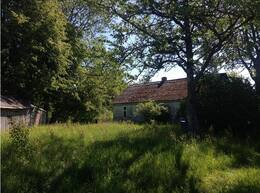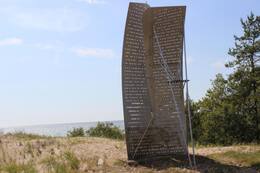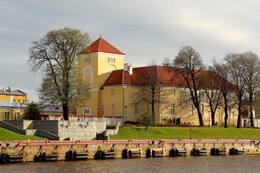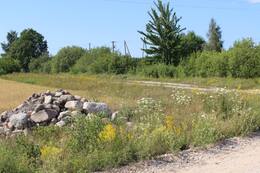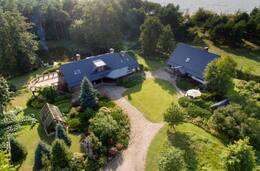Paskutinė Kārlio Skalbės gimtadienio šventė Kuržemės pajūryje
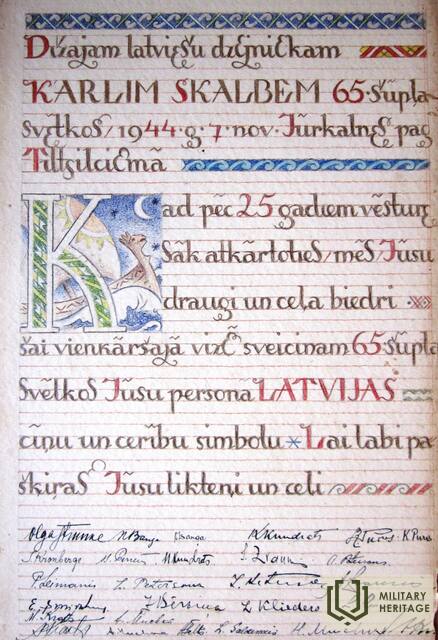
1944 m. lapkričio 7 d. Latvijos pabėgėlių gyvenvietėje Kuržemės pakrantėje vyravo šviesi nuotaika, kai Jūrkalnės „Laukgaļi“ vykę poeto Kārlio Skalbės 65-ojo gimtadienio minėjimai. Vos po keturių dienų Kārlis Skalbė laivu išplaukė į Švediją kaip pabėgėlis. Tą dieną Kārlis Skalbė paskutinį kartą atšventė savo gimtadienį.
„Pilkoje pabėgėlių kasdienybėje nepamirštamas, šviesus išgyvenimas buvo poeto Kārlio Skalbės 65-ojo gimtadienio minėjimas Jūrkalnės „Laukgalyje“. Dailininkas Niklāvas Strunkė jau buvo pradėjęs ruošti kreipimąsi poeto 65-ojo gimtadienio proga lapkričio 7 d. „Grīniekiuose“. Jo darbas nebuvo lengvas – maži, tamsūs žvejų kambariai, o aplinkui nuolat buvo judėjimas, minia, triukšmas. [...] Lapkričio 7 d. visa pabėgėlių šeima, tiek individualiai, tiek grupėmis, aplankė gražųjį Latvijos juvelyrą – didįjį poetą Kārlį Skalbę. Nebuvo įteikta jokių vertingų dovanų, kaip kartais būtų nutikę ir būtų tinkama kitomis aplinkybėmis, nebuvo sakomos panegirikos, tačiau kiekvienas sveikintojas didžiajam juvelyrui atnešė savo latviškos širdies šilumą ir kokią nors smulkmeną, naudingą pabėgėlių kasdieniams poreikiams. Sergantis poetas (jis sirgo inkstų liga) su žmona, dukra, žentu ir anūku Andrejumi „Laukgalyje“ turėjo atskirą mažą kambarį. Rudens tamsa... Vakarus išsklaidydavo tik žvakės galiukas. Inžinierius ir agronomas kartu atnešė dovanų žibalo butelį.
FJ Šteinmanis. Ventspilio ryšių grupė - „Švedijos laivai“. Ventspilis 700. Raštų ir prisiminimų rinkinys, Torontas, 1990, p. 126.
Susijusi laiko juosta
Susijusios temos
Susijusios vietos
„Laukgalių“ namai, rašytojo Kārlio Skalbės rezidencija
Jūrkalnės valsčiaus „Laukgaliai“, vieta, kurioje rašytojas Kārlis Skalbe apsistojo 1944 m. spalio–lapkričio mėnesiais, laukdamas pabėgėlių laivo į Švediją.
Rašytojas Kārlis Skalbe (1879–1945) buvo Latvijos laikinosios nacionalinės tarybos ir Latvijos liaudies tarybos narys, Latvijos Respublikos Konstitucinio susirinkimo ir I bei IV Saeimų deputatas. Vokiečių okupacijos metais jis buvo literatūrinio žurnalo „Latvju Mēnešraksts“ vyriausiasis redaktorius, vienas iš LKP 1944 m. kovo 17 d. memorandumo signatarų.
1944 m. lapkričio 11 d. ji pabėgo į Švediją. Mirė 1945 m. Stokholme.
Jūrkalnėje pabėgėlių atminimo ženklas „Vilties burė“
Atminimo ženklas „Vilties burė“ skirtas Antrojo pasaulinio karo pabėgėliams, 1944 ir 1945 m. laivu perplaukusiems Baltijos jūrą į Gotlando salą Švedijoje. Memorialas yra Osvalkuose, kopose tarp jūros ir Ventspilio–Liepojaus greitkelio, netoli viešojo transporto stotelės „Kaijas“. Jį sukūrė skulptorius Ģirtas Burvis, kuris jį įgyvendino kaip vilties burę, simbolizuojančią Latvijos pabėgėlių atminimą.
Nuo 1944 m. rudens iki 1945 m. pavasario, bijodami atnaujintos sovietų okupacijos, bet nenorėdami evakuotis į nuniokotą ir grasinamąją Vokietiją, kai kurie Latvijos piliečiai bandė jūra pasiekti artimiausią neutralią šalį – Švediją. Kai kuriuos laivus organizavo Latvijos centrinė taryba, padedama Vakarų sąjungininkų šalių, todėl Jūrkalnės valsčiuje atsirado vienas didžiausių pabėgėlių koncentracijos taškų. Be Latvijos centrinės tarybos organizuotų laivų, per jūrą buvo perplaukta ir kitų laivų. Manoma, kad jūrą pavyko perplaukti apie 5000 žmonių. Žuvusiųjų skaičius nežinomas, nes nebuvo registruojami pabėgėliai, paliekantys Kuržemės pakrantę.
Kelionės buvo pavojingos, nes pabėgėliams grėsė vokiečių patruliai pakrantėje ir jūroje, jūrų minos, sovietų lėktuvai ir karo laivai, taip pat audros, nes kirtimai dažnai vykdavo netinkamais ir perkrautais kateriais bei valtimis, neturint pakankamai kuro ir maisto atsargų, jūros žemėlapių ir navigacijos prietaisų. Išvykimai iš Latvijos buvo vykdomi slapta. Laivų tikslas buvo Gotlando sala, o kelionės dažniausiai prasidėdavo Kuršo vakarinėje pakrantėje (nuo Jūrkalnės iki Gotlando yra 90 jūrmylių arba apie 170 kilometrų tiesia linija).
Kalėjimas Livonijos ordino pilyje Antrojo pasaulinio karo metu
1944–1945 metais Livonijos ordino pilyje įkurtame kalėjime buvo sulaikyti keli LKP Ventspilio ryšių grupės nariai ir pabėgėlių valčių operatoriai.
Laivininko Žanio Fonzovo prisiminimai: „Iš Švedijos išplaukė du laivai – „Krīvs“ ir „Zvejnieks“. Aš buvau „Zvejnieks“, o įguloje buvo Saulītė ir Grunti. [...] Oras buvo gražus, plaukiau taip nepastebimai, nelabai aukštai. Iškart pamačiau – plaukiau Morzės abėcėle. Laivas artėjo. Nusileidau į mašinų skyrių, nes be Saulytės dokumentų, maišelyje turėjau ir atvykusiųjų laiškus giminaičiams Latvijoje bei surinktus ginklus. Į tą ginklų maišą sumečiau laiškus ir dokumentus, o viską permečiau už borto... Kas tada! Laivas priartėjo prie mūsų, o vokiečiai paprašė mūsų vairavimo leidimų. [...] Taigi spalio 21 d. vokiečiai mus su visu „Zvejnieku“ nuvežė į Ventspilį. Nuvežė mus į kalėjimą. Kambaryje buvo apie 30 žmonių. Ant nugaros turėjau avikailio paltą, pasitiesiau jį ant grindų ir apsivilkau pats, bet praėjusią naktį nemiegojau. Antrą ar trečią dieną... Jie iškvietė mus apklausai. Buvome susitarę prisipažinti, kad esame pabėgėliai, keliaujantys į Vokietiją. Aš tik norėjau nuvykti į Lielirbę sekti savo draugo. Atrodo, kad jie tada mumis patikėjo. [...] Tačiau tada situacija Ventspilyje pasikeitė: miestą perėmė karinė administracija, ir mes buvome antrą kartą iškviesti apklausai. Buvo dar blogiau, nes mums parodė švediškų degtukų dėžutę ir kronos monetą, kurie neva buvo rasti laive. Vienas iš tardytojų buvo latvis, ir jis net nukirsdino mums galvą už tai, kad pasakėme visą tiesą. Matėme, kad pasaka baigėsi, tiesiog turėjome prisipažinti.
Kelias į „Grīnieki“ namus Vārvės valsčiuje
Kelias į „Grīnieki“ namus Vārvės valsčiuje, kur 1944 m. buvo įsikūrusi viena pagrindinių Kuržemės pakrantės pabėgėlių gyvenviečių.
Laivininko V. Jurjako prisiminimai: „Įėjus į „Grīniekių“ kiemą, viskas atrodo labai įprasta. Ramus kaimo namas, nė gyvos dvasios, tikriausiai žmonės saulėje. [...] Paaiškėjo, kad ne tik „Grīniekių“ gyvenamasis namas buvo pilnas žmonių, bet ir visi pastatai buvo pilni. Tvartas, klėtis, šieno palėpė ir pirtis. Sutikau vieną ar du pažįstamus, nes atėjo laikas palikti mūsų žemę. [...] Mitybos situacija nebuvo kritinė, bet gana prasta. [...] Vakare pabėgėlių karavanas pradėjo judėti link jūros kranto. Iš anksto visus perspėjau, kad neitų iš krūmų prie jūros kranto, nes netoliese buvo pakrantės sargybos apkasai ir stebėjimo postai. Tai buvo didelis karavanas, nes apie 200 žmonių ėjo į jūros krantą. Nebuvo jokios vilties, kad visi atvyks laiku. Vakaras nebuvo labai tamsus, ir galėjau apžvelgti visos grupės veiklą. Įspūdingiausi buvo dideli „Kai žmonės gyveno „Grīniekiuose“, jų nematė, bet dabar, kai jie buvo atvežti į...“ šviesą, jie matė tik tai. Vien prekėms reikėjo visos valties. Prekių prikrovėme 3–4 dviejų arklių vežimus, o po jų – žmones. [...] Ilgai laukėme valties, bet ji neatvyko. Visas karavanas turėjo grįžti atgal. Buvo labai tamsu.“
Jūrkalnėje pabėgėlių atminimo ženklas „Vilties burė“
Atminimo ženklas „Vilties burė“ skirtas Antrojo pasaulinio karo pabėgėliams, 1944 ir 1945 m. laivu perplaukusiems Baltijos jūrą į Gotlando salą Švedijoje. Memorialas yra Osvalkuose, kopose tarp jūros ir Ventspilio–Liepojaus greitkelio, netoli viešojo transporto stotelės „Kaijas“. Jį sukūrė skulptorius Ģirtas Burvis, kuris jį įgyvendino kaip vilties burę, simbolizuojančią Latvijos pabėgėlių atminimą.
Nuo 1944 m. rudens iki 1945 m. pavasario, bijodami atnaujintos sovietų okupacijos, bet nenorėdami evakuotis į nuniokotą ir grasinamąją Vokietiją, kai kurie Latvijos piliečiai bandė jūra pasiekti artimiausią neutralią šalį – Švediją. Kai kuriuos laivus organizavo Latvijos centrinė taryba, padedama Vakarų sąjungininkų šalių, todėl Jūrkalnės valsčiuje atsirado vienas didžiausių pabėgėlių koncentracijos taškų. Be Latvijos centrinės tarybos organizuotų laivų, per jūrą buvo perplaukta ir kitų laivų. Manoma, kad jūrą pavyko perplaukti apie 5000 žmonių. Žuvusiųjų skaičius nežinomas, nes nebuvo registruojami pabėgėliai, paliekantys Kuržemės pakrantę.
Kelionės buvo pavojingos, nes pabėgėliams grėsė vokiečių patruliai pakrantėje ir jūroje, jūrų minos, sovietų lėktuvai ir karo laivai, taip pat audros, nes kirtimai dažnai vykdavo netinkamais ir perkrautais kateriais bei valtimis, neturint pakankamai kuro ir maisto atsargų, jūros žemėlapių ir navigacijos prietaisų. Išvykimai iš Latvijos buvo vykdomi slapta. Laivų tikslas buvo Gotlando sala, o kelionės dažniausiai prasidėdavo Kuršo vakarinėje pakrantėje (nuo Jūrkalnės iki Gotlando yra 90 jūrmylių arba apie 170 kilometrų tiesia linija).
„Bambalių“ namai – viena iš pagrindinių laivais išplaukusių pabėgėlių apgyvendinimo vietų
Restauruoti „Bambalių“ namai Ošvalkuose, Jūrkalnės valsčiuje, kurie 1944 m. buvo viena pagrindinių valtimis išplaukusių pabėgėlių apgyvendinimo vietų Kuržemės pakrantėje.
Valčių pabėgėlio Kārlio Dravinio prisiminimai: „„Bambaliai“ buvo seni, maži, labai apgriuvę namai Jūrkalnės valsčiuje, maždaug už 40 kilometrų nuo Ventspilio. [...] Drėgnoje vietoje plytėjo nedideli laukai, bet kitoje pusėje juos apaugusi kopa apvyniojo. Už jų šiek tiek čiurlenėjo jūra – namai buvo prie pat jūros. Kitoje pusėje, už pusės kilometro, ėjo Paviluosto–Užavos plentas, bet kelias iki namų juo nebuvo lengvas, todėl vokiečiai čia negalėjo būti kasdieniai svečiai. Vieta, kur laukė valtys, buvo lengvai pasiekiama – nedidelė miško proskyna ant aukšto kranto. [...]
„Bambalių“ savininkė ir jos grupė, kurios taip pat laukė „vandens judėjimo“, gyveno dviejuose kambariuose, nukreiptuose į jūrą, o pabėgėlių grupė gyveno kitame namo gale, taip pat dviejuose kambariuose. Jie dalijosi virtuve. Koridorius tarp dviejų galų buvo prikimštas daugybės pabėgėlių daiktų. Kambariai buvo prikimšti šiaudų, kurie buvo išdėlioti palei sienas. Kiekvienoje kambario pusėje buvo po vieną lovą, kurioje miegojo motina su vaikais. Šiaudinės lovos dieną buvo užklotos paklodėmis ar kuo nors kitu. Dieną jie išeidavo jose pasėdėti ar pamiegoti, nes daugiau nebuvo kur apsistoti. [...] Dienos slinko monotoniškai, viena po kitos. Jie keldavosi pagal komandą, neskubėjo. Kai bendri pusryčiai buvo pavalgę, vieni eidavo žaisti kortomis, kiti ėmėsi būrimo, treti bandė skaityti. Vieniems reikėjo atlikti namų ruošos darbus – atnešti malkų, vandens.





